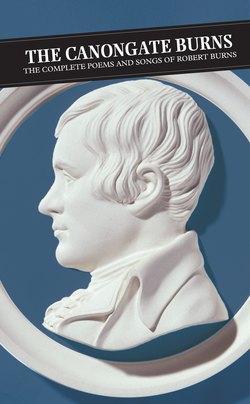Читать книгу The Canongate Burns - Robert Burns - Страница 36
На сайте Литреса книга снята с продажи.
On a Scotch Bard
ОглавлениеGone to the West Indies
First printed in the Kilmarnock edition, 1786.
A’ Ye wha live by sowps o’ drink, who, mouthfuls
A’ ye wha live by crambo-clink, who, doggerel verse
A’ ye wha live and never think, who
Come, mourn wi’ me
5 Our billie’s gien us a’ a jink, friend, given, the slip
An’ owre the Sea. over
Lament him a’ ye rantan core, merry crowd
Wha dearly like a random-splore; who, frolic
Nae mair he’ll join the merry roar, no more
10 In social key;
For now he’s taen anither shore, taken another
An’ owre the Sea! over
The bonie lasses weel may wiss him, handsome, well, wish
And in their dear petitions place him:
15 The widows, wives, an’ a’ may bless him
Wi’ tearfu’ e’e; eye
For weel I wat they’ll sairly miss him well I trust/know, sorely
That’s owre the Sea! over
O Fortune, they hae room to grumble! have
20 Hadst thou taen aff some drowsy bummle, taken off, bungler
Wha can do nought but fyke an’ fumble, who, fuss
’Twad been nae plea; it would have, no
But he was gleg as onie wumble, keen-eyed, gimlet (phallus)
That’s owre the Sea! over
25 Auld, cantie KYLE may weepers wear, old, cheerful, mourning cuffs
An’ stain them wi’ the saut, saut tear: salt, salt
’Twill mak her poor auld heart, I fear, old
In flinders flee: splinters fly
He was her Laureat monie a year, poetic champion, many
30 That’s owre the Sea! over
He saw Misfortune’s cauld Nor-west cold, north-
Lang-mustering up a bitter blast; long-
A Jillet brak his heart at last, broke
Ill may she be!
35 So, took a berth afore the mast,
An’ owre the Sea! over
To tremble under Fortune’s cummock, rod
On scarce a bellyfu’ o’ drummock, stomachful, meal & water
Wi’ his proud, independent stomach,
40 Could ill agree;
So, row’t his hurdies in a hammock, rolled, hips/buttocks
An’ owre the Sea! over
He ne’er was gien to great misguidin, given
Yet coin his pouches wad na bide in; pockets would not stay
45 Wi’ him it ne’er was under hidin,
He dealt it free: gave it away
The Muse was a’ that he took pride in,
That’s owre the Sea! over
Jamaica bodies, use him weel, folk, well
50 An’ hap him in a cozie biel: shelter, cosy place
Ye’ll find him ay a dainty chiel, friendly fellow
An’ fou o’ glee: full of good nature
He wad na wrang’d the vera Deil, would not wrong, very Devil
That’s owre the Sea! over
55 Fareweel, my rhyme-composing billie! farewell, friend
Your native soil was right ill-willie: ill-willed
But may ye flourish like a lily,
Now bonilie!
I’ll toast you in my hindmost gillie, last gill (whisky)
60 Tho’ owre the Sea! over
There is unresolved critical contention about the reality of Burns’s plan to immigrate to Jamaica. Kinsley writes (Vol. III, p. 1176):
The spirit of On a Scotch Bard, though sturdily more cheerful than that of the letters, hardly justifies Daiches’s view that Burns was never serious about emigrating (pp. 95, 189). He was volatile, and ready to shift to extremes; he was capable of representing his misfortunes as tragic or comic, as occasions for dependency or from a display of swaggering courage. ‘I have heard Wordsworth praise the ready flow of verse in this poem,’ says Cunningham (1834, II. 288), ‘and recite with much emotion the eighth and ninth stanza’.
Facts would seem to be on Kinsley’s side. The poet’s letters are detailed about the voyage. The ship’s delay seems to have prevented the journey. What is not in doubt is the degree of tormented uncertainty underlying the poetry of that period. He did want to be the rooted, celebrated Bard of Kyle. The bitter fracas with Jean Armour’s family had, however, thrown him into the merciless path of his Auld Licht enemies. He wrote to Dr Moore that:
I had for some time been skulking from covert under all the terrors of a Jail; as some ill-advised, ungrateful people had uncoupled the merciless legal Pack at my heels (Letter 125).
The writ was taken out by Mr Armour, Jean’s father (Letter 254). Even in October 1786, after the Kilmarnock edition, he could still write:
… the consequences of my follies, which may perhaps make it impracticable to stay at home … I have some time been pining under secret wretchedness … the pang of disappointment, the sting of pride, with some wandering stabs of remorse, which never fail to settle on my vitals like vultures … My gaiety is the madness of an intoxicated criminal under the hands of the executioner (Letter 53).
Despite the moment of deeply ill-judged self-pity with the denigration of Jean (ll. 34–5) as mere jilt, the poem is fuelled, if not quite by the ‘madness of an intoxicated criminal’ then certainly by the wild energy of a partly comic revenge fantasy on his often betraying fellow countrymen and women who, in his absence, will certainly bitterly discover what they have lost. Exile and cunning but not silence are part of this national poet’s repertoire.
It should also be noted that this is, deliberately, not straight biography. The poem’s tone and content are wittily distanced by being the monologue of an unnamed but sympathetic poet narrator. This poet, addressing his impoverished fellow poets, turns Burns’s particular case into a general view, as in Goldsmith, of the penurious state of the poetic career in the late eighteenth century. Wordsworth’s perceptive admiration for its linguistic and metrical virtues probably extended to a mutual sympathy for this theme.
